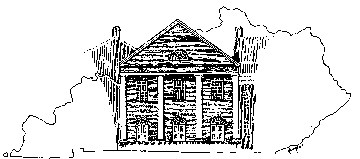By the 1840s, slavery was the foremost political and social issue in American society. In the Methodist Episcopal Church, the issue came to a head in 1844.
Bishop James O. Andrew of Georgia married a woman who owned slaves, which precipitated heated debate at the General Conference over the propriety of a direct episcopal connection to slaveholding. The northern majority demanded that the bishop cease exercising the functions of his office until this impediment was removed, and that led to an impasse with the southern conferences. The final result was a Plan of Separation which provided for two Methodist Episcopal Churches, North and South.
Delegates from the southern conferences met at a Convention at the Fourth Street Church in Louisville, Kentucky, May 1-19, 1845 and organized the Methodist Episcopal Church, South. As recorded in the new denomination’s Book of Discipline, “The Convention…declared by solemn resolutions, the jurisdiction hitherto exercised by the General Conference of the M. E. Church over the conferences in the slave-holding States, entirely dissolved, and erected the said Annual Conferences into a separate ecclesiastical connection, under the style and title of “The Methodist Episcopal Church, South.”
The Methodist Episcopal Church was the largest denomination in the United States, and its division was to many observers an omen of what could happen to the nation as well as to other churches.
“Scarcely any public occurrence has happened for a long time that gave me so much real concern and pain as this menaced separation. I will not say that it would necessarily produce a dissolution of the political union of these States, but the example would be fraught with imminent danger.” [Henry Clay to W. A. Booth, reacting to the news of the 1844 Methodist Episcopal General Conference]
The separation in Methodism lasted until 1939, when the northern and southern Methodist Episcopal Churches and the Methodist Protestant Church merged to form The Methodist Church.
The Fourth Street Methodist Episcopal Church, built in 1816, was the second home of the first Methodist society in Louisville (1806). In 1852 it moved to Fifth and Walnut Streets, and after other mergers and closures is now part of Fourth Avenue United Methodist (founded 1888). The site of the 1816 building is now part of the Kentucky International Convention Center.
Points of interest at this Heritage Landmark: A state historical marker is at the site of the Fourth Street Methodist Episcopal Church and briefly describes its historical importance.
Special events: None as of this writing.
Area attractions: Louisville is home to numerous museums, art galleries, and theaters, and has the largest extant collection of Victorian houses in the USA.
To visit: The plaque is accessible at all hours.
Location: Within the boundaries of the Kentucky Annual Conference, in Jefferson County. The site is on Fourth Street, between Market and Jefferson. The state historical marker is near the southeast corner of Fourth and Market Streets.
Food and lodging: There are numerous restaurants and hotels in the city of Louisville.
Directions: From east, west, and north, take Interstate 65 south to the Hospitals and Jefferson Street exit. Turn west on Jefferson Street (one-way), right onto 5th Street (one-way), and right again onto Market Street (one-way).
From the south, take Interstate 65 north to the Muhammad Ali exit. Turn west on Muhammad Ali, right on 5th Street (one-way), and right again on Market Street (one-way).
For further information, contact: Charles W. Brockwell, Jr., 3907 Ashridge Drive, Louisville, KY 40241.
To learn more about United Methodist church history in this area:
Former Louisville Annual Conference Depository, Library Learning Center, Kentucky Wesleyan College, P.O. Box 1039, 3000 Frederica St., Owensboro, KY 42301; Richard Weiss, Archivist.
C. C. Goen, Broken Churches, Broken Nation: Denominational Schisms and the Coming of the American Civil War (Macon, GA: Mercer University Press, 1985).
Roy H. Short, Methodism in Kentucky (Louisville: Commissions on Archives and History of Kentucky and Louisville Conferences, 1979).

